Overview
The article titled "10 Essential High-Level Programming Languages for 2025" addresses the pressing challenges developers encounter in the evolving tech landscape. It identifies programming languages crucial for the future, such as Python, Java, and Kotlin, which are significant in fields like data science, enterprise applications, and mobile development. Furthermore, it highlights how tools like Kodezi can enhance programming efficiency, showcasing their features, industry demand, and growing importance.
Are you facing difficulties in keeping up with the latest programming languages? Kodezi provides a solution by streamlining coding processes, allowing developers to focus on what truly matters. With its intuitive features designed to improve productivity, Kodezi stands out as a vital resource for modern developers.
By utilizing Kodezi, developers can expect not only improved productivity but also elevated code quality. This platform empowers users to tackle complex coding tasks with ease, thereby enhancing their overall development experience.
In conclusion, exploring the tools available on Kodezi could be a game-changer for developers aiming to stay ahead in their careers. The relevance of programming languages highlighted in the article, combined with the efficiency gains from Kodezi, positions developers for success in the dynamic landscape of 2025.
Introduction
In the fast-paced world of programming, developers often face numerous challenges that can hinder productivity. As the demand for efficient coding practices escalates, innovative tools like Kodezi have emerged to address these issues effectively. Kodezi streamlines workflows by automating documentation and debugging, allowing developers to concentrate on what truly matters: crafting high-quality code.
Why struggle with tedious tasks when you can enhance your coding experience? Kodezi offers features designed to boost productivity and improve code quality, making it an essential tool for modern developers. With its user-friendly interface and powerful capabilities, Kodezi not only simplifies the development process but also empowers developers to achieve more in less time.
As we look towards 2025, understanding the significance of various programming languages becomes crucial for any developer aiming to stay competitive. From the robust capabilities of C and C++ for system programming to the versatility of Python in data science, and the modern elegance of Kotlin for Android development, each language offers unique advantages tailored to specific applications. Furthermore, the transformative impact of AI-driven tools like Kodezi on the development landscape cannot be overstated. This article explores these programming languages, highlighting their key features, real-world applications, and how they can be leveraged to enhance your coding journey.
Kodezi | Professional OpenAPI Specification Generator - AI Dev-Tool: Streamline Your Coding Process
In the fast-paced world of software development, coding challenges can often hinder progress. Developers frequently find themselves bogged down by the tedious task of documentation, which can detract from their ability to focus on writing high-quality code. This is where Kodezi shines as a robust AI-driven tool that automates the creation of OpenAPI specifications, drastically reducing the time programmers dedicate to documentation tasks.
Kodezi addresses these challenges head-on by streamlining the coding process. With its features, developers can concentrate on crafting high-quality code while ensuring their APIs are meticulously documented and standardized. This capability is particularly advantageous in collaborative environments, where precise documentation is crucial for enhancing team efficiency and driving project success. Furthermore, with , teams can auto-heal codebases, further enhancing productivity and minimizing the time spent on pull requests.
The benefits of using Kodezi extend beyond mere documentation. It offers automated code reviews and seamless synchronization of API documentation, facilitating efficient documentation while boosting overall productivity. The effortless deployment of changes as part of existing release processes and the automatic generation of Swagger UI sites for API testing are key features that contribute to Kodezi's effectiveness. In addition, as two-thirds of enterprises are projected to adopt AI for internal automation tasks by 2025, the relevance of tools like Kodezi becomes increasingly clear.
Industry leaders emphasize that incorporating AI into documentation processes not only speeds up delivery but also promotes innovation and dependability—both crucial for long-term success in software creation. Mohan Jayaraman, Vice President of Emerging Technologies at Softura, encapsulates this sentiment perfectly: 'Integrating AI into DevOps and development workflows isn’t just about speeding up delivery—it's about enabling innovation, reliability, and scalability for long-term success.' Why not explore Kodezi and see how it can transform your coding practices?
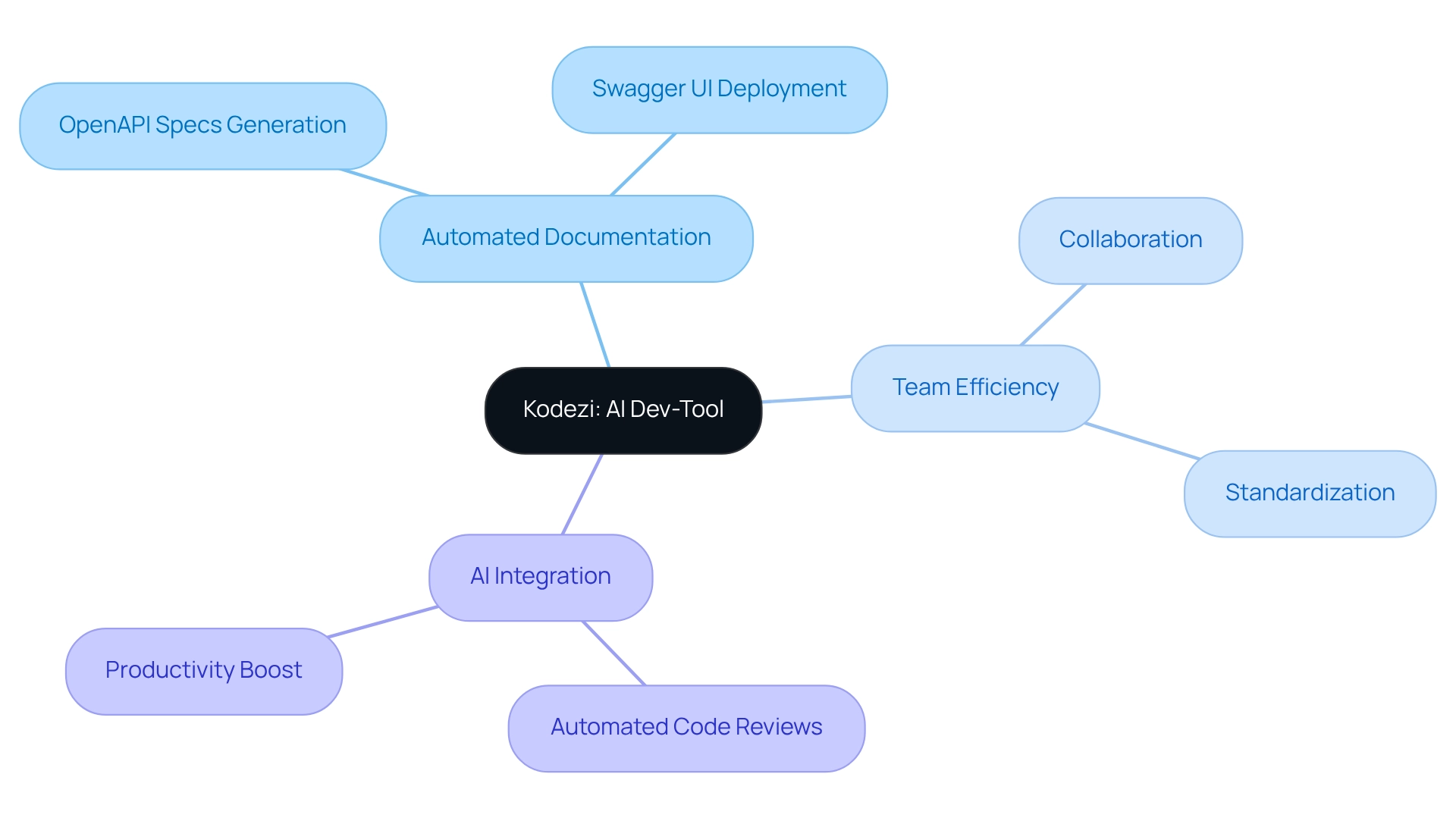
C: The Cornerstone of System Programming
C is frequently celebrated as the 'mother' of contemporary languages, establishing the foundation for numerous others. Its unmatched efficiency and accurate control over system resources make it crucial for system programming, embedded systems, and performance-critical uses. As of 2025, C remains a dominant force in operating systems and firmware development, with its applications extending to high-performance computing. The demand for programmers skilled in C is strong, reflecting its ongoing significance in the tech landscape.
Indeed, although JavaScript was among the most sought-after languages by tech learners in 2024, C's essential role in system development guarantees that it remains a vital skill for professionals. Experts stress that mastering C is essential for anyone aiming to excel in system development, as it provides them with the skills needed to address complex challenges in software creation. As one unnamed software engineer aptly remarked, "Computers are quick; programmers maintain them sluggish," emphasizing the significance of efficient coding practices.
Furthermore, the job market shows a strong preference for candidates with , underscoring its relevance in today's technology-driven world. C and C++ are particularly ideal for embedded systems due to their efficiency and control over hardware, making them indispensable in this domain.
With its lasting legacy and continuing uses, C programming is not merely a foundational skill but an essential resource for programmers striving to succeed in the changing environment of system programming.
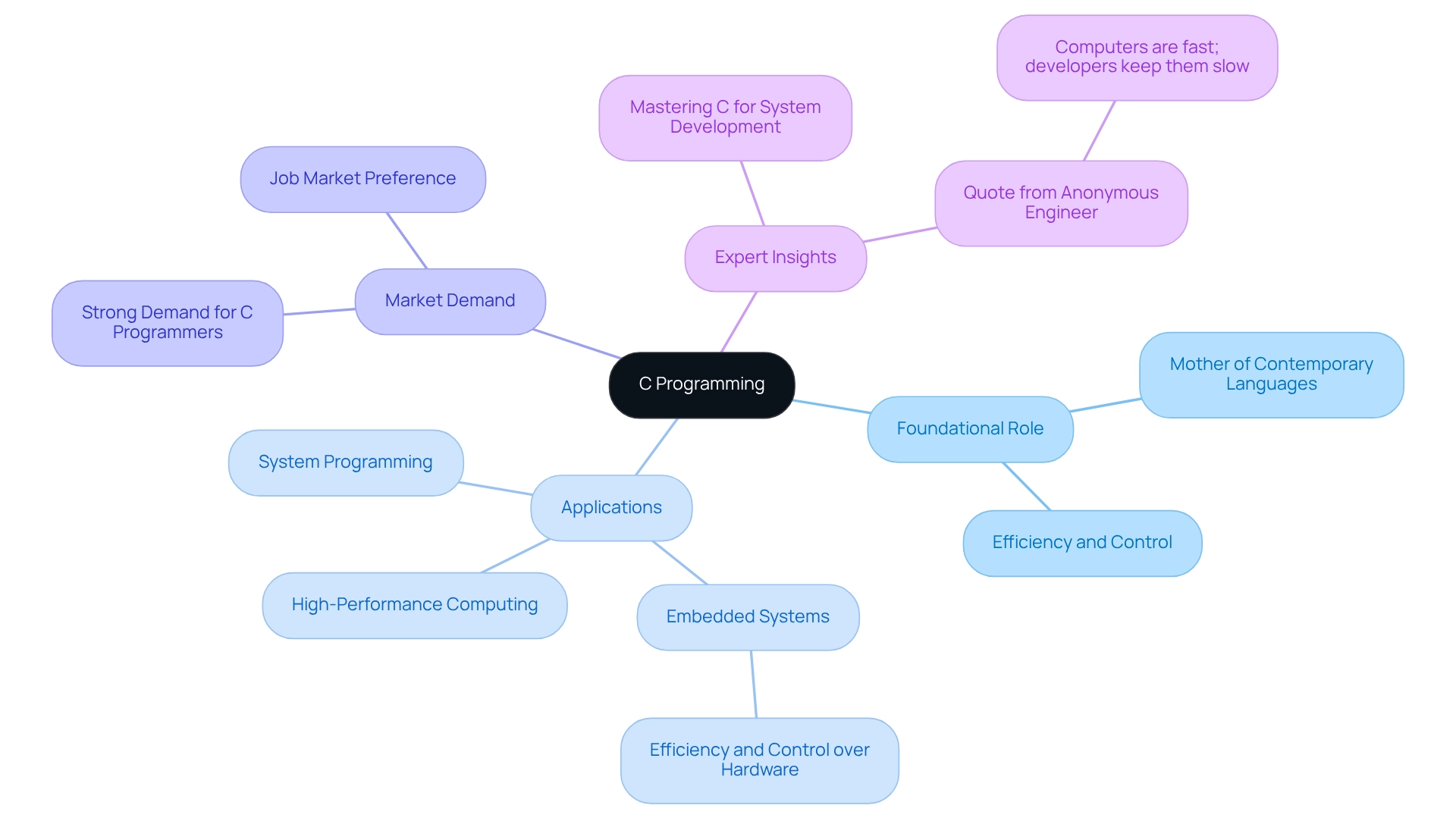
Java: The Backbone of Enterprise Applications
Java continues to be a cornerstone in , celebrated for its robustness, scalability, and a rich ecosystem of libraries. As we move into 2025, the language has undergone significant updates that enhance both performance and programmer productivity. Notably, the introduction of features such as pattern matching and records streamlines coding processes, enabling programmers to write cleaner and more efficient code. How does this evolution reflect in the programming landscape? According to the TIOBE Programming Community, Java maintains a strong market share, underscoring its continued relevance.
Real-world examples illustrate Java's effectiveness. Companies leveraging Java frameworks report [substantial improvements in developer productivity](https://blog.kodezi.com/10-ai-code-ide-tools-to-boost-your-development-efficiency), enabling faster deployment cycles and more efficient resource management. For instance, a recent case study emphasized how a top company employed Spring to decrease their software deployment time by 30%. This showcases Java's significant impact on operational efficiency.
Furthermore, as enterprise applications increasingly shift towards cloud-based solutions, Java's adaptability ensures it remains relevant, with a market share that continues to grow in 2025. In addition, tools such as Kodezi enhance Java programming by offering automated code debugging, which allows programmers to swiftly identify and address issues, optimize performance, and ensure security compliance. The Kodezi CLI, in particular, enables teams to auto-heal codebases in seconds, streamlining the development process and enhancing productivity.
Expert insights highlight Java's progression. One programmer asserts, "Java's robust community backing and vast libraries render it the perfect option for large-scale projects that demand reliability and maintainability." This sentiment underscores Java's essential role in addressing the intricate requirements of contemporary business settings, making it an invaluable resource for programmers seeking to create scalable and maintainable applications.
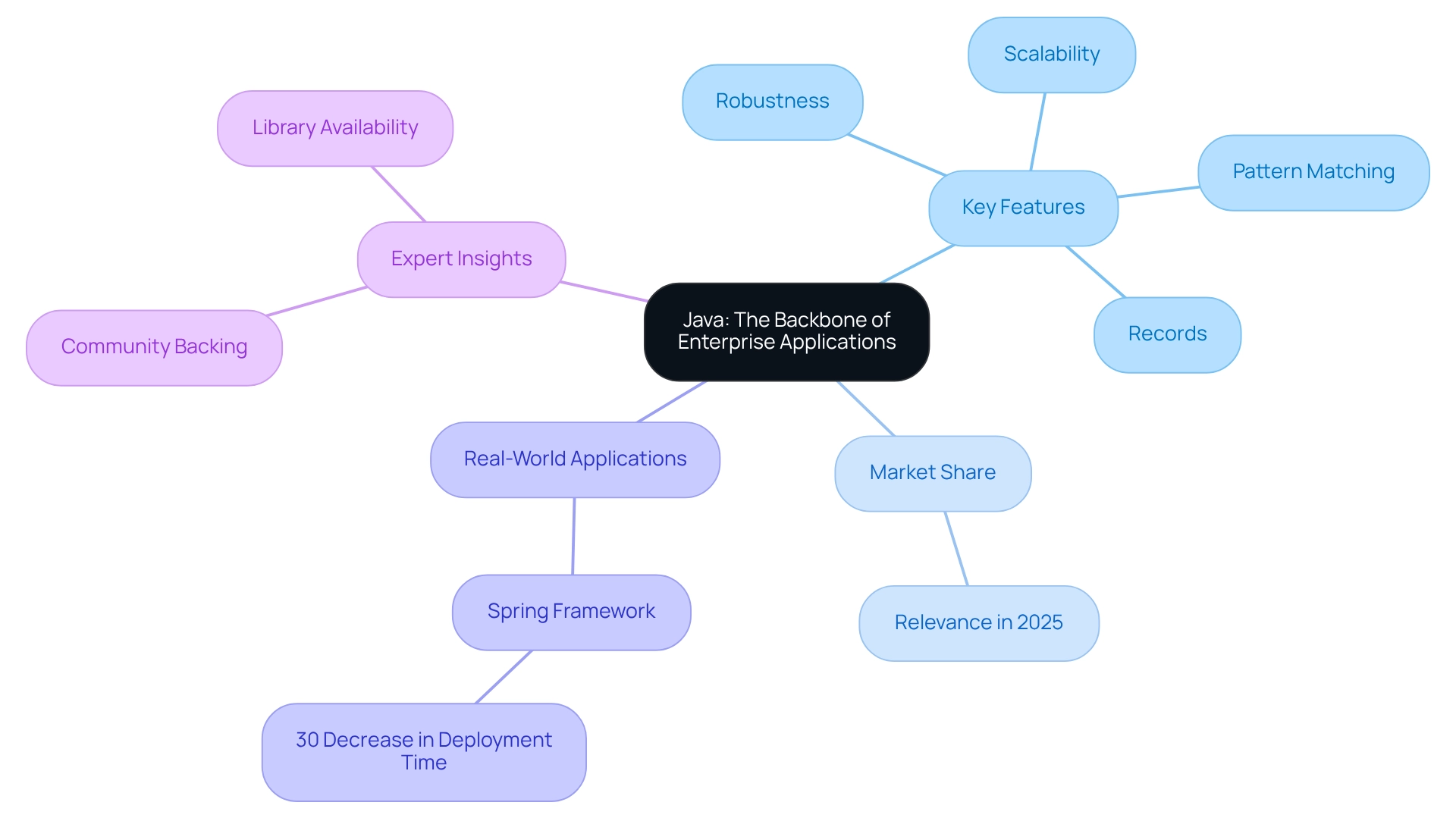
Python: The Go-To Language for Data Science and Automation
In 2025, Python has firmly established itself as the premier language for data science and automation. Its robust libraries—including Pandas for data manipulation, NumPy for numerical computations, and TensorFlow for machine learning—enable programmers to tackle complex data analysis and machine learning challenges effortlessly. The language's inherent simplicity and readability make it an ideal choice for newcomers, while its advanced capabilities cater to seasoned professionals, reinforcing its dominance in the technology sector.
According to recent statistics, over 70% of data scientists favor Python for their projects. This trend is driven by the language's versatility and the growing ecosystem of libraries that facilitate rapid development and deployment of machine learning models. Furthermore, the expansion of libraries like Scikit-learn and Keras has further increased Python's attractiveness, offering programmers powerful tools for constructing advanced algorithms.
Expert insights highlight the advantages of Python in machine learning, with many data scientists praising its extensive community support and comprehensive documentation. As Jim L. Barksdale aptly stated, "If we have data, let’s look at data. If all we have are opinions, let’s go with mine." This accessibility fosters innovation and collaboration, allowing teams to leverage Python's capabilities effectively.
Case studies illustrate Python's impact in various industries, such as the one titled 'The Power of Data in Decision Making,' which showcases how organizations that harness Python for data-driven decision-making have reported significant improvements in operational efficiency and predictive accuracy. This underscores the language's critical role in .
As Python continues to evolve, its libraries for machine learning and data analysis are expected to grow, further solidifying its status as the go-to language for developers aiming to enhance productivity and drive impactful results in 2025. Additionally, Hal Varian's belief that statisticians will be highly sought after in the future emphasizes the growing need for data analysis skills, further supporting Python's relevance in the field.
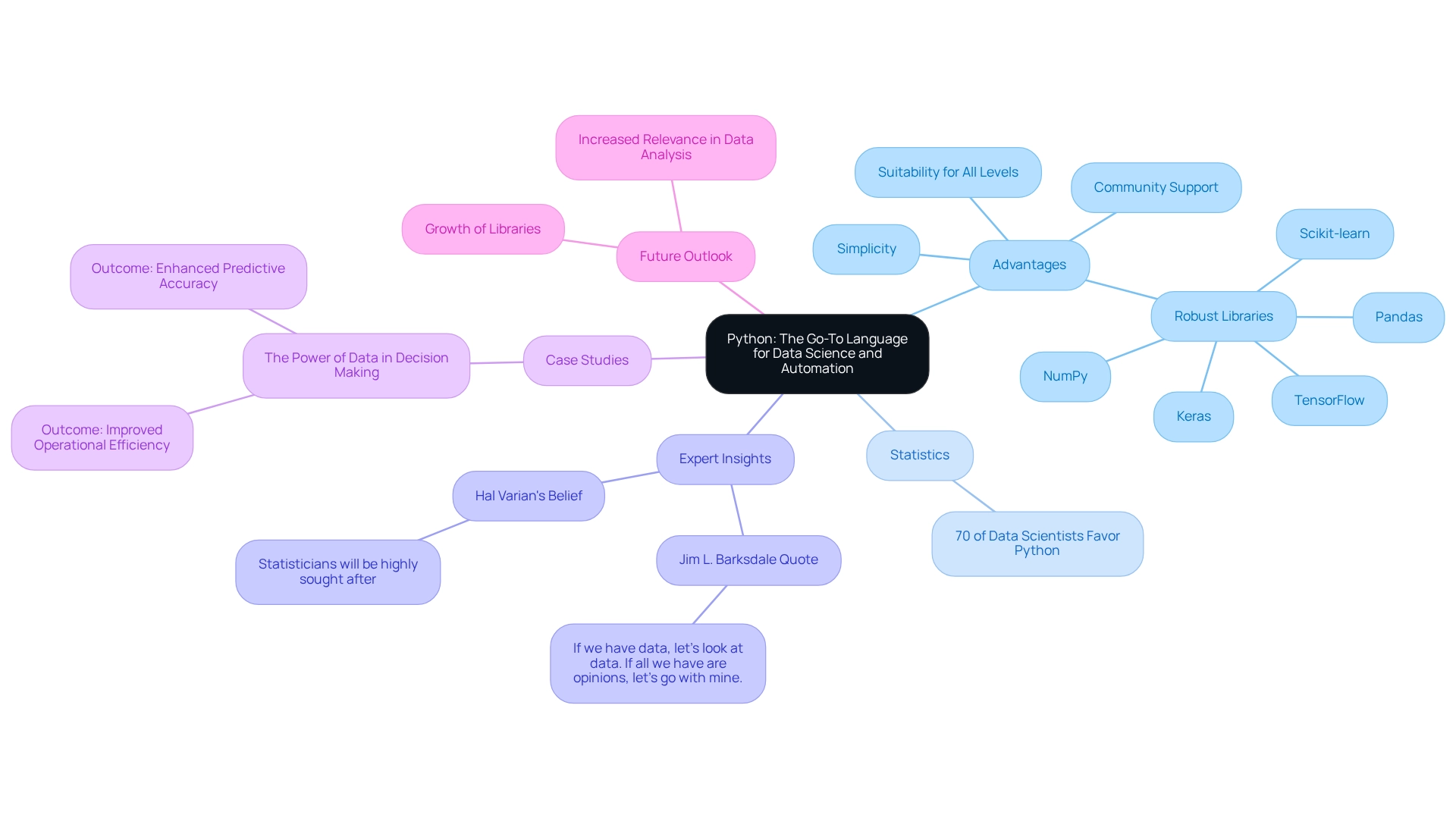
C++: The Language of High-Performance Applications
C++ continues to be the leading language for high-performance software in 2025, celebrated for its low-level memory management features and outstanding execution speed. This makes it especially well-suited for game development, real-time simulations, and system design. The language's support for object-oriented programming and templates enables programmers to create efficient, scalable applications that can adjust to the evolving requirements of modern computing environments.
In addition to its foundational strengths, C++ now benefits from advanced automated code debugging tools that allow programmers to instantly identify and resolve codebase issues. These tools provide detailed explanations and insights into what went wrong and how it was resolved, ensuring that performance bottlenecks are addressed swiftly. Furthermore, they enhance security compliance by ensuring adherence to , adding exception handling, and improving code formatting in any part of the codebase. This capability is crucial in high-stakes environments like gaming, where resource management and execution speed are paramount.
The job market for C++ programmers in gaming and simulations is strong, indicating a rising need for talented individuals who can utilize the language's advantages. In 2025, C++ is anticipated to excel in high-performance computing, with its uses ranging from intricate gaming engines to sophisticated simulation software. According to recent statistics, C++ is expected to maintain a substantial portion of the market in high-performance applications, further reinforcing its reputation as a favored option among programmers.
Game creators often reference C++'s benefits in real-time simulations, emphasizing its capability to handle resources efficiently and provide high-speed performance. As one game creator remarked, "C++ enables us to extend the limits of what’s achievable in real-time visuals, guaranteeing that our games operate seamlessly even under significant demands." A recent case study showcased a gaming company that utilized C++ to optimize their engine, resulting in a 30% increase in frame rates and enhanced user experience.
As sectors progressively depend on high-performance computing, C++ is set to stay a vital contributor in the creation of advanced software, with a job market demand that keeps expanding in gaming and simulations. The integration of automated debugging and performance optimization tools further enhances C++'s appeal, ensuring that programmers can maintain security compliance and adhere to coding standards in seconds.
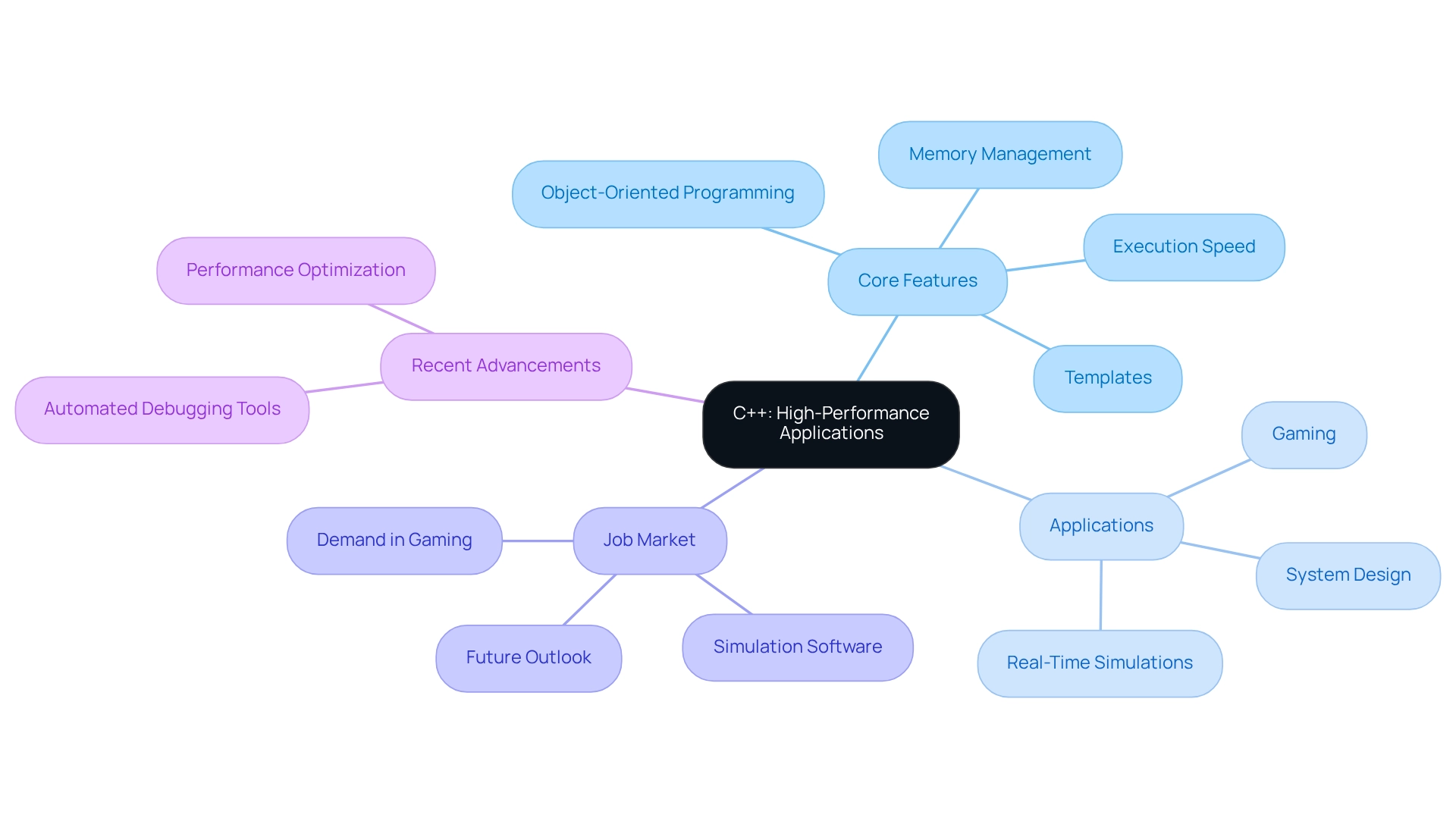
JavaScript: The Essential Language for Web Development
JavaScript remains the foundation of web engineering in 2025, fueling the creation of . The popularity of frameworks like React, Angular, and Vue.js enables programmers to create responsive user interfaces that significantly improve user experience. These frameworks are preferred for their efficiency and capability to simplify the creation process, enabling quick deployment of features that fulfill user needs.
The versatility of JavaScript extends beyond client-side scripting. With the rise of Node.js, programmers can utilize JavaScript for server-side coding, making it an essential resource for full-stack engineering. This dual capability enables seamless integration between front-end and back-end processes, fostering a cohesive creation environment.
In 2025, JavaScript frameworks are projected to grow further, with trends indicating increased adoption of server-side technologies like Deno and advancements in WebAssembly. These advancements are anticipated to improve performance and broaden the options for web applications.
As the need for proficient web programmers keeps increasing, with an estimated market worth of $672 billion by 2027, the significance of JavaScript frameworks for user experience cannot be emphasized enough. Developers acknowledge that these tools are crucial for crafting engaging, efficient, and user-friendly software, reinforcing JavaScript's position as an important language in the web creation arena.
Furthermore, the incorporation of tools like Kodezi improves the programming process by offering automated code debugging features, which consist of comprehensive explanations and insights into code problems. This allows developers to instantly identify and fix codebase problems, ensuring that their applications adhere to the latest security best practices and coding standards. The Kodezi CLI additionally assists teams by automating code evaluations and boosting programming efficiency, simplifying the maintenance of high-quality code during the lifecycle of the project.
Specific features such as fixing performance bottlenecks and ensuring security compliance illustrate how Kodezi's tools improve the creation process. This synergy between JavaScript and Kodezi's tools exemplifies the ongoing evolution of web development, where efficiency and quality are paramount.
Furthermore, the economic context is emphasized by the fact that South African web creators receive an average hourly rate of $19.85, while U.S. programmers earn between $48,164 and $141,079 annually. This illustrates the lucrative opportunities available for those skilled in JavaScript, further emphasizing the language's significance in the industry.
Go: The Language for Cloud and Microservices
Go, or Golang, has emerged as a premier programming language for cloud computing and microservices in 2025. Its lightweight syntax, combined with robust concurrency support, enables developers to create scalable applications that efficiently manage substantial workloads. The language's design facilitates the creation of distributed systems, making it especially well-suited for cloud-native architectures.
Did you know that over 40% of Go programming is concentrated in the technology sector? Significant adoption is also observed in financial services, transportation, retail, and media/gaming industries. This trend underscores Go's critical role in modern software development, particularly within cloud environments. Furthermore, can command salaries upwards of $170,000 per year, reflecting the high demand for expertise in this language.
Real-world applications exemplifying Go's capabilities include high-performance microservices that leverage its efficient handling of concurrent processes. Developers praise Go for its simplicity and effectiveness, noting that it allows for rapid development cycles without sacrificing performance. As organizations increasingly prioritize scalability and reliability, Go's ecosystem of libraries and frameworks continues to expand, further enhancing its appeal for cloud computing projects.
Expert opinions emphasize Go's syntax as a key advantage, enabling programmers to write clean and maintainable code. For instance, a cloud engineer observed, "Go's concurrency model enables us to manage numerous requests at the same time, which is essential for our high-traffic software." This model is particularly advantageous for applications requiring high availability and responsiveness. As Go's adoption in cloud computing expands, it is poised to remain a top choice for developers looking to create scalable, efficient software. Additionally, case studies showcasing Go's implementation in various cloud projects illustrate its effectiveness in real-world scenarios, further solidifying its reputation in the industry.
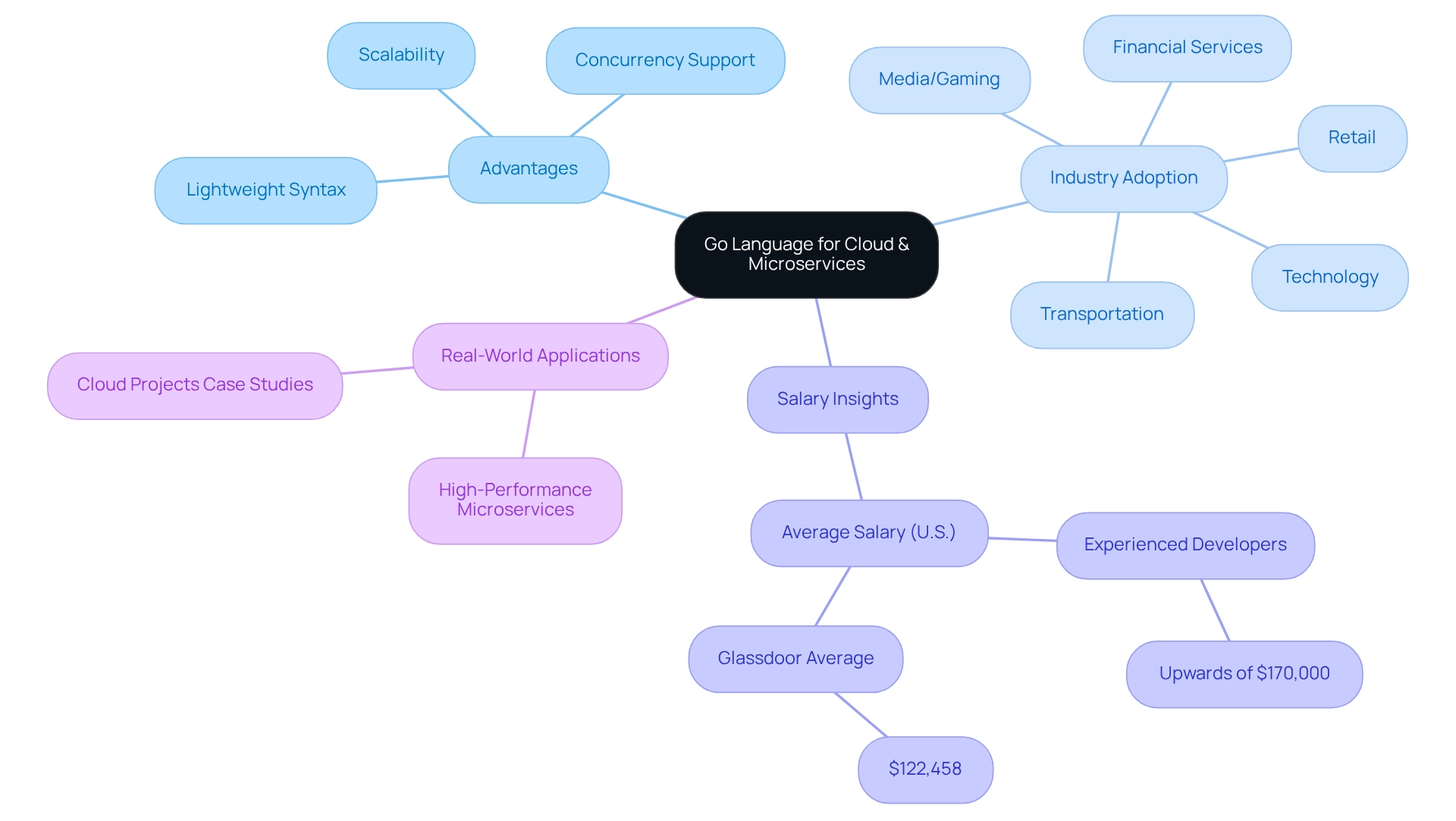
Rust: The Safe and Fast Language for Systems Programming
In 2025, Rust has solidified its position as a leading systems language, renowned for its emphasis on safety and performance. Central to Rust's appeal is its innovative ownership model, which effectively eliminates memory leaks and data races, thereby enhancing software security. This model protects against typical coding pitfalls and enables creators to write secure, concurrent code with assurance.
Rust's performance metrics compete with those of C and C++, establishing it as a perfect option for performance-critical uses. Its ability to deliver high efficiency without compromising safety has led to a notable increase in adoption rates among developers focused on systems programming. As organizations prioritize secure software development, Rust's safety features become increasingly appealing, particularly when paired with Kodezi's automated code debugging capabilities that quickly identify and resolve issues, enhance performance, and ensure security compliance.
Real-world applications of Rust's ownership model demonstrate its effectiveness in creating robust systems. Conversations within programming communities emphasize Rust's benefits compared to conventional languages, especially its dependency manager, Cargo, which streamlines project management and boosts programmer productivity. A programmer remarked, "Cargo surpasses the C/C++ tools in terms of user-friendliness. It's by far the best dependency manager I've used."
Statistics reveal that Rust continues to gain traction, having been the most starred language on GitHub until Swift emerged. This reflects a growing trend towards prioritizing memory safety and performance in system design. Furthermore, Qovery's active recruitment of Rust programmers highlights the growing demand for Rust expertise in the industry. As more developers acknowledge the advantages of Rust, especially its compatibility with advanced code optimization and security compliance through tools like Kodezi, its popularity is anticipated to grow, further solidifying it as a cornerstone in the realm of systems development for 2025.
Discover how Kodezi can improve your Rust coding experience by offering automated debugging and customized for contemporary software needs. Are you ready to enhance your coding practices with Kodezi's innovative features?
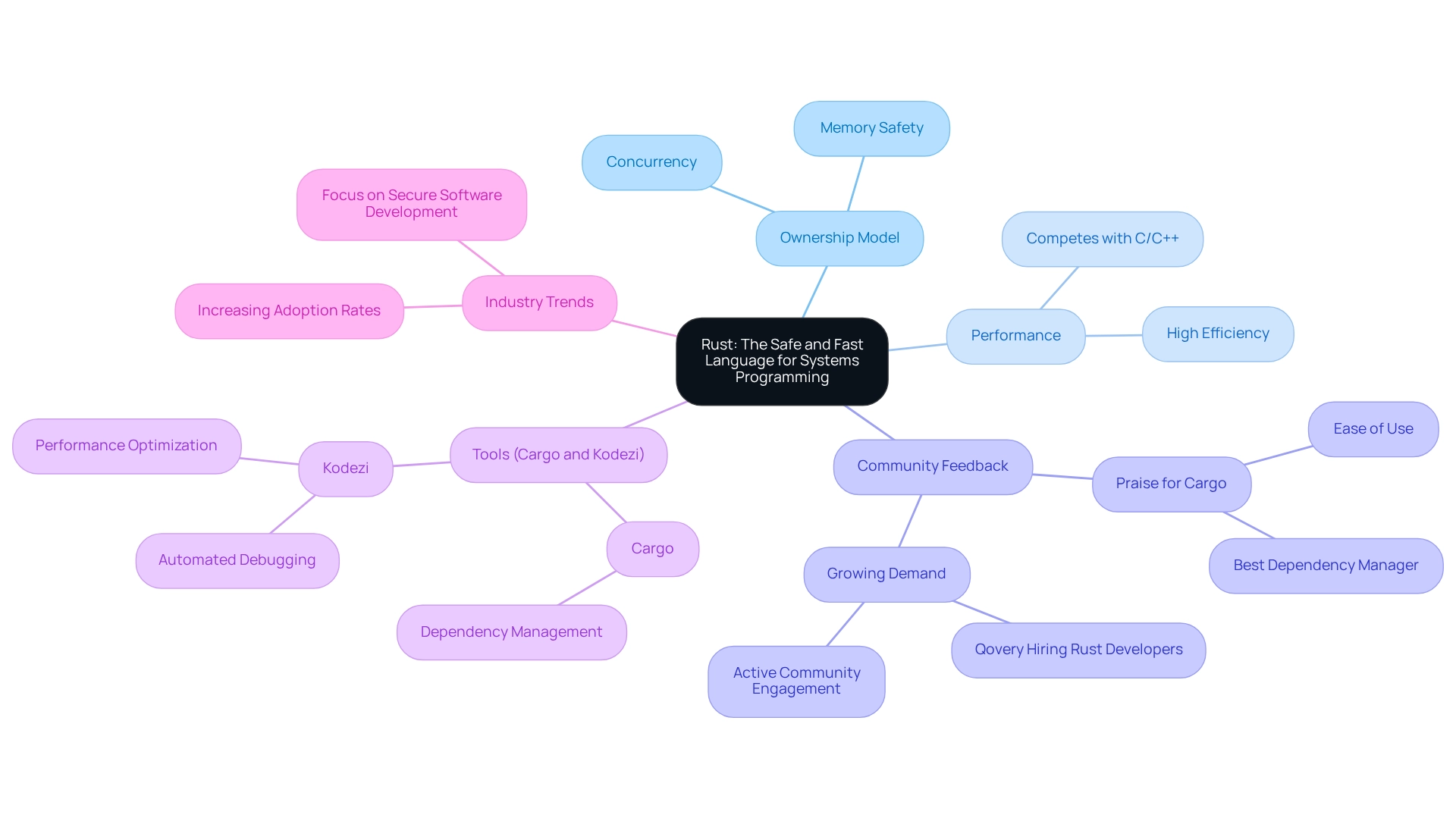
Kotlin: The Modern Language for Android Development
Kotlin has firmly established itself as the primary language for Android development in 2025, driven by its concise syntax and modern coding features. Its full interoperability with Java allows programmers to utilize existing Java libraries while crafting cleaner, more maintainable code. Significantly, Kotlin's backing for functional programming and its strong null safety attributes enable programmers to build .
Real-world applications built with Kotlin, such as Pinterest and Trello, showcase its effectiveness in delivering high-quality user experiences. According to a recent survey, 85% of programmers reported that Kotlin significantly reduces boilerplate code compared to Java, enhancing their productivity. Developers have expressed strong satisfaction with Kotlin, often citing its ease of use. One mobile developer stated, "Kotlin has changed my approach to Android programming; it feels more intuitive and less cumbersome than Java."
As Kotlin continues to gain traction, trends indicate an increasing reliance on its advanced features, such as coroutines for asynchronous programming and extension functions that enhance code readability. By 2025, Kotlin's usage statistics in Android programming are anticipated to exceed 70%, indicating its increasing dominance in the field. This shift is further backed by expert views emphasizing Kotlin's role in streamlining the creation process and enhancing code maintainability. An industry expert remarked, "Kotlin not only streamlines coding but also improves the overall quality of applications, making it the preferred option for contemporary Android creation."
Furthermore, incorporating tools such as Kodezi can greatly improve the Kotlin programming experience. How can Kodezi address common coding challenges? Kodezi's automated code debugging enables programmers to swiftly identify and resolve issues by offering detailed explanations and insights into what went wrong and how to fix it. This ensures that their code adheres to the latest security best practices and coding standards. The Kodezi CLI also offers teams the ability to auto-heal codebases, optimizing performance and enhancing productivity.
In addition, with Java programmers receiving competitive wages averaging approximately $105,000 in the United States, mastering Kotlin offers a valuable chance for professionals aiming to improve their career opportunities in the mobile creation field. Are you ready to explore the tools available on the Kodezi platform and elevate your coding experience?
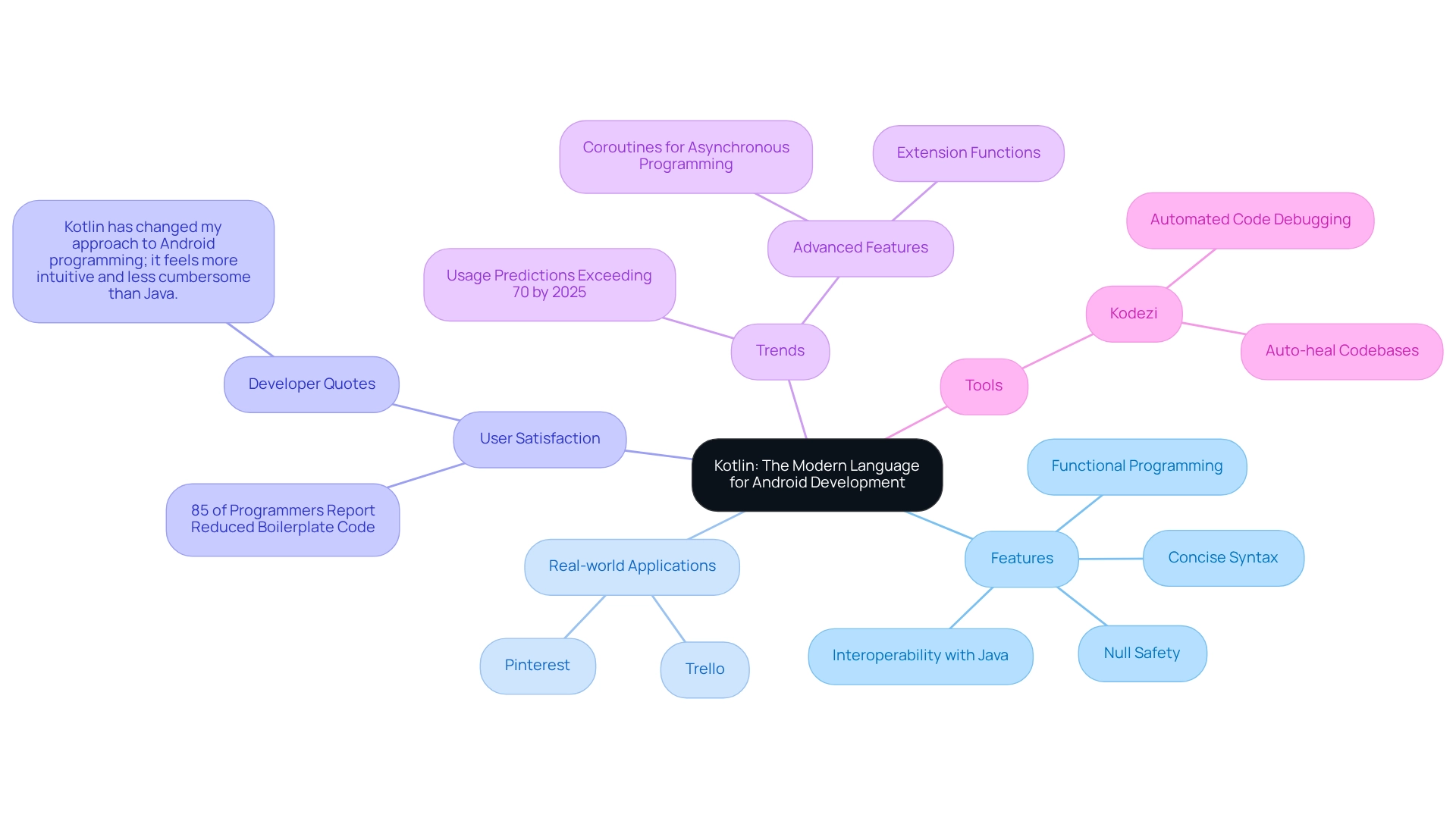
Swift: The Language for iOS Development
Swift remains the leading choice for iOS development in 2025, offering a modern and efficient programming experience. Its syntax is designed for clarity, making it accessible for newcomers while providing strong functionalities for experienced programmers. Notably, Swift employs Automatic Reference Counting (ARC) for effective memory management, enhancing performance on Apple devices. This optimization ensures that applications operate smoothly across all iOS platforms.
In 2025, Swift's supremacy is underscored by its increasing market share in iOS development, with a notable preference among programmers over Objective-C. Many programmers cite Swift's safety features and user-friendliness as primary reasons for their selection, aligning with the trend of companies progressively investing in AI technologies—61% intend to do so by the year's conclusion. This shift emphasizes the significance of incorporating machine learning capabilities into software, a task for which Swift is well-suited. As Apple states, "Swift is created to be a type-safe and memory-safe programming language," reinforcing its appeal to developers focused on safety and performance.
Real-world applications of Swift are evident in numerous successful projects, with over 1,000 delivered by a team of certified experts. This impressive track record showcases Swift's efficiency in practical scenarios, contributing to better code quality and improved customer experiences. Customer experience is crucial for brand loyalty, with 96% of customers emphasizing its importance. By adopting Swift, programmers can create applications that not only perform well but also encourage positive interactions with users.
To further enhance productivity, individuals utilizing Swift can leverage Kodezi CLI, which offers . These capabilities enable programmers to swiftly recognize and address issues within their codebases, ensuring compliance with the latest security best practices and coding standards. As iOS development trends evolve, Swift's continuous updates and features, combined with Kodezi's tools, solidify its position as the preferred language for mobile applications, ensuring developers can meet the demands of modern app development effectively.
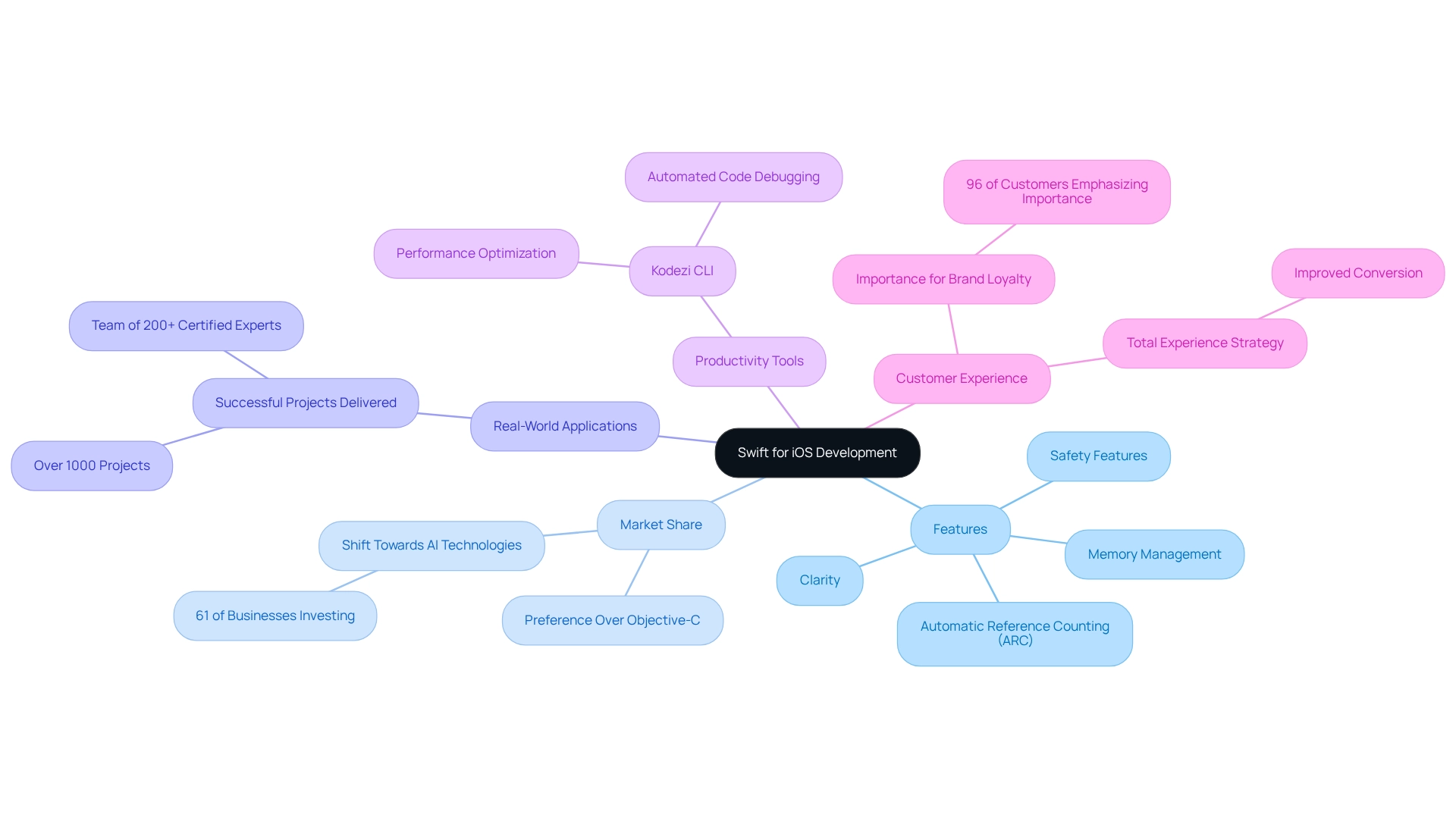
Conclusion
The programming landscape is constantly changing, and as we approach 2025, the importance of mastering a diverse range of languages is undeniable. Developers face numerous coding challenges, from the foundational role of C in system programming to the robust capabilities of Java for enterprise applications. Each language serves a specific purpose tailored to distinct development needs. For instance, Python continues to lead in data science and automation, while C++ is favored for high-performance applications. JavaScript dominates web development, complemented by the rise of Go for cloud computing and microservices, and Rust is reshaping systems programming with its focus on safety and performance.
Furthermore, innovative tools like Kodezi are addressing these challenges by enhancing productivity and code quality. By automating tedious tasks such as documentation and debugging, Kodezi allows developers to focus on what truly matters: delivering high-quality applications. This synergy between programming languages and advanced tools is crucial for fostering innovation, scalability, and reliability in software development.
In addition, the journey toward becoming a proficient developer necessitates a commitment to continuous learning and adaptation. Embracing a diverse skill set and leveraging powerful tools not only enhances individual capabilities but also contributes to the broader success of development teams and projects. As the demand for skilled developers grows, staying ahead of the curve by mastering these languages and tools will be essential in shaping the future of technology. Are you ready to explore how Kodezi can transform your coding experience?
Frequently Asked Questions
What is Kodezi and how does it assist developers?
Kodezi is an AI-driven tool that automates the creation of OpenAPI specifications, significantly reducing the time developers spend on documentation. It allows developers to focus on writing high-quality code while ensuring their APIs are well-documented and standardized.
What are the key features of Kodezi?
Kodezi offers features such as automated code reviews, seamless synchronization of API documentation, effortless deployment of changes, automatic generation of Swagger UI sites for API testing, and the ability to auto-heal codebases using the Kodezi CLI.
How does Kodezi enhance productivity in collaborative environments?
Kodezi streamlines the coding process, allowing teams to concentrate on coding while maintaining precise documentation. This is crucial for improving team efficiency and driving project success.
Why is the adoption of AI tools like Kodezi becoming more relevant?
As two-thirds of enterprises are projected to adopt AI for internal automation tasks by 2025, tools like Kodezi are increasingly important for speeding up delivery, promoting innovation, and enhancing reliability in software development.
What benefits does Kodezi bring beyond documentation?
Beyond documentation, Kodezi facilitates automated code reviews and boosts overall productivity by allowing for efficient documentation practices and faster deployment cycles.
How does Kodezi contribute to the software development lifecycle?
Kodezi automates several processes in the software development lifecycle, including documentation, code review, and deployment, which helps teams work more efficiently and reduces the time spent on pull requests.




